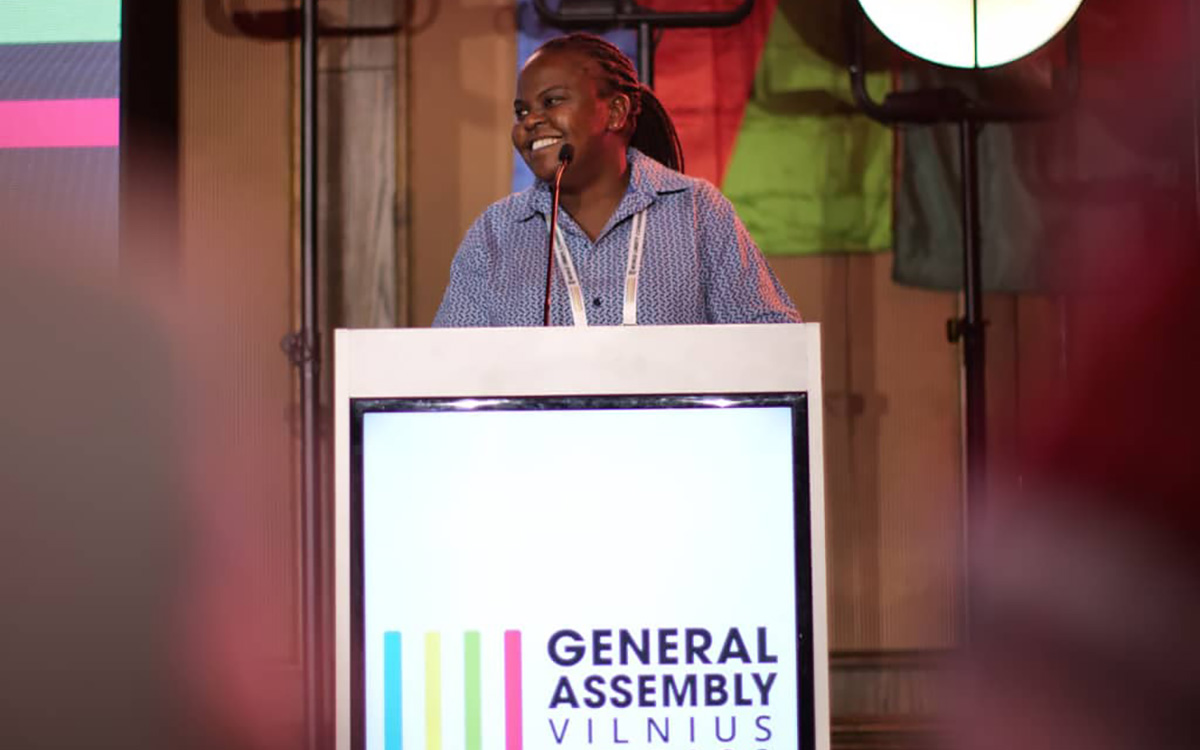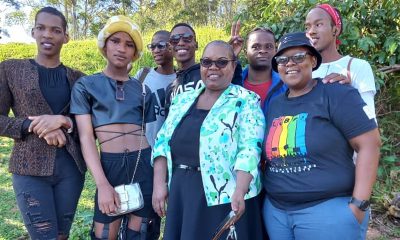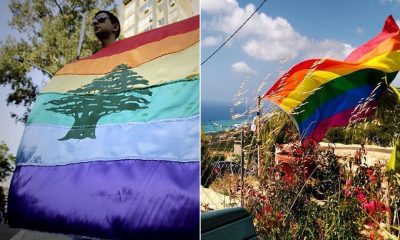Africa
Eswatini police detain prominent human rights activist, LGBTQ ally
Tanele Maseko taken into custody on March 28 at border crossing

Eswatini police on March 28 detained a prominent human rights activist as she tried to return to the country.
Tanele Maseko, the deputy chairperson of the Southern Africa Human Rights Defenders Network, was taken into custody at the Ngwenya Border Post between Eswatini and South Africa. Reports indicate she was returning to Eswatini with her two minor children and an aide when authorities told her she was wanted.
SAHRDN said Maseko’s detention stemmed from her husband’s gruesome murder in January 2023.
Thulani Maseko was a high-profile lawyer, human rights activist and LGBTQ rights ally who was highly outspoken against the country’s governance.
“Southern Defenders has previously strongly condemned recent public statements from the government of Eswatini seemingly threatening Tanele Maseko for demanding justice and accountability for her husband’s murder,” said SAHRDN Chair Adriano Nuvunga. “Tanele Maseko is our deputy chairperson and human rights defender in her own right. As a normal human being, she, together with her children are victims of the traumatic events of Jan. 21, 2023, and need to know the truth for closure and healing.”
The Pan African Human Rights Defenders Network said Tanele Maseko’s detention is embarrassing and something not expected from a country that claims to protect all of its citizens.
“We are deeply concerned by the continued harassment of Mrs. Tanele Maseko by the authorities in Eswatini,” said Hassan Shire, the group’s chair. “The treatment that Mrs. Tanele Maseko and her children are receiving amounts to torture, inhumane and degrading treatment, that is totally banned under international law.”
The Southern Africa Litigation Center in a statement said Maseko and her family are now the target of unsolicited harassment.
“Instead of anyone being held accountable for Thulani Maseko’s death, Mrs. Maseko and her young children have been the target of unsolicited harassment, persecution and intimidation by the authorities in Eswatini, including facing constant and cruel defamatory threats from government spokespersons,” said SALC in a statement. “Accountability and moral consequences must not remain elusive, hanging beyond the grasp of grieving hearts and demanding voices.”
Vongai Chikwanda, Amnesty International’s deputy regional director for East and Southern Africa, said Eswatini authorities should stop weaponing the criminal justice system to target and harass Tanele Maseko.
“The judicial harassment of Tanele Maseko and her family is a clear violation of her human rights including the rights to liberty, freedom of expression and freedom of movement,” said Chikwanda. “Instead of using the criminal justice system to target, intimidate and harass Tanele Maseko, Eswatini authorities should focus on promptly, thoroughly, independently, impartially, transparently and effectively investigating Thulani Maseko’s murder and bringing to justice those suspected to be responsible.”
Lydia Dlamini, the acting commissioner of the Royal Eswatini Police Service, dismissed claims around Tanele Maseko’s arrest.
“In the wake of Thulani Maseko’s murder, concerted investigations ensued which at the early stage included obtaining a preliminary statement from his wife who was the only adult present at the time of the incident,” said Dlamini.
“As normal practice and a follow-up to the preliminary statement, repeated attempts were made to meet with Mrs. Tanele Maseko to shed on various issues concerning the murder of her husband. Despite repeated requests, Mrs. Maseko was not even cooperative as even in instances where agreements had been reached on her availing herself,” added Dlamini. “In addition to not cooperating on this aspect of the investigation into her husband’s death, Mrs. Maseko also failed or refused to surrender herself and her late husband’s mobile phones, which the police had requested as these could possibly contain crucial information which could assist on this investigation.”
Dlamini said police at the border asked Tanele Maseko to go to police headquarters in Mbabane, the country’s capital, with her lawyers for questioning about her husband’s murder.
“To ensure compliance and to mitigate against the risk of evasion as had been previously been the case, she was requested to surrender her travel documents together with her mobile phone to which she agreed. Thereafter, she drove herself to the police headquarters in the company of her children,” said Dlamini.
Dlamini said the interview was postponed until Tuesday.
“The engagement with Mrs. Maseko is crucial in obtaining vital information needed for a breakthrough in the investigation and therefore, must avail herself unreservedly,” said Dlamini. “No amount of distraction will sway the focus on the investigation.”
Maseko is no longer detained, but is still under police surveillance until authorities complete their investigation.
Africa
For queer Nigerians, being on gay dating apps is still a risk
Homophobes target users for violence

Gay hookup apps like Grindr, and dating apps like Tinder and Bumble have managed to proliferate queer communities in countries like Nigeria.
Those who seek one night stands find what they want while those looking for love equally find what they seek. These platforms have managed to position themselves as safe spaces for queer people in anti-gay Nigeria. In recent times, however, it is proving to be unsafe, as homophobic people are quickly learning about the apps, and opening accounts that either seek to outrightly threaten queer people, or pretend to be queer, have long chats with gay people, invite them over, and inflict violence on them.
Take the case of Biodun, a queer Nigerian man who joined Grindr to meet up with guys like him.
After Biodun had built a connection and agreed to meet with someone whose display name was “Mamba,” they decided to meet up only for him to be met with violence. Apparently, Mamba ran a catfish account.
“I’ll never forget that day,” Biodun, who asked the Washington Blade not to use his last name because of safety concerns, said. “I still think about it, and sometimes blame myself for being very careless, even though Grindr was supposed to be our safe space.”
Biodun’s experience isn’t peculiar to him.
In Nigeria, draconian laws that criminalize same-sex relationships exist, making queer people turn to the digital realm to explore their identities and seek connections beyond the confines of societal oppression that comes with the physical environment. Gay dating apps such as Grindr, therefore, have emerged as virtual sanctuaries, offering spaces for queer Nigerians to forge friendships, find solidarity, and pursue romantic or sexual relationships. Spaces like this, however, have morphed into a landscape fraught with danger, as homophobic people have weaponized these platforms to perpetuate hate and violence.
“Sometimes, I often wonder how they learned about these platforms,” Daniel, which is not his real name, told the Blade. “You would think that it is just us in the platforms, until you find out that the accounts are rooted in homophobia.”
One time, someone’s bio read, “I’m only here to deal with the gay people. I know all of you, and I will find and kill you. We no want una for here (translates to we do not want you here, in English.)” It was a stark reminder that these spaces are no longer LGBTQ-friendly for Nigerians. In 2014, there was the passage of the Same-Sex Marriage Prohibition Act by former President Goodluck Jonathan, which not only criminalized same-sex unions, but also imposed severe penalties on anyone involved in LGBTQ advocacy or support.
This law catalyzed a surge in discrimination and violence against queer Nigerians; emboldening regular civilians, religious extremists, and even law enforcement agencies to target individuals perceived as deviating from traditional gender and sexual norms. Again, amid this hostile environment, gay dating apps emerged as lifelines for many queer Nigerians, offering avenues for discreet communication, community building, and the pursuit of intimate relationships.
The very anonymity and freedom these apps provided, however, became double-edged swords.
The advent of screenshot and screen-recording capabilities on these apps, for example, reduced the risks of exposure, strengthening the safety and privacy of users. However, this also comes with its own lapses, as queer people using Grindr have often relied on screenshots and screen recordings to confirm the identities of potentials with their friends, before accepting to meet.
“Before the removal of the screenshot option, I usually shared photos of others with my trusted friends,” Biodun shared. “But since that was taken off, there was no way for me to do that.”
Although, according to Grindr’s terms and conditions, the removal came with privacy concerns, as it was to facilitate a safe dating experience.
This erosion of digital safe spaces is depriving queer Nigerians of vital avenues for self-expression and affirmation,and is exacerbating the psychological toll of living in a society that continues to systematically demonize their identities. Moreover, the normalization of homophobic rhetoric and violence in both physical and digital realms has perpetuated a cycle of fear and oppression, and is reinforcing this notion that LGBTQ individuals are inherently unworthy of dignity and respect. Despite these challenges, though, the resilience of queer Nigerians continue to persist, as they defy societal norms and assert their right to love and be loved.
Africa
Upcoming Ugandan Census will not count intersex people
Advocacy group report documents rampant discrimination, marginalization

Uganda’s national Census next month will not count intersex people.
The revelation about the exclusion of intersex Ugandans in the 9-day Census exercise that will begin on May 10 has been confirmed to the Washington Blade by the head of Uganda’s Bureau of Statistics.
UBOS Executive Director Chris Mukiza in response to the Blade’s questions on the issue said the agency has “no business with intersex.”
Their counting could have made Uganda the second African country and the third globally after Australia and Kenya to collect an intersex person’s data in a Census.
Kenya’s 2019 Census determined there were more than 1,500 intersex people in the country.
Uganda had a population of 34.8 million, according to the country’s last Census that took place in 2014.
Intersex people in Uganda are among marginalized groups, subject to stigma and discrimination. The government has yet to recognize them as the third sex and consider them among other minority groups, such as people with disabilities, who enjoy special treatment.
Intersex people cannot be exclusively categorized as male or female for having a biological congenital condition with unique sex characteristics due to inherent and mixed anatomical, hormonal, gonadal, or chromosomal patterns that could be apparent before, at birth, in childhood, puberty, or adulthood.
Mukiza’s position of excluding intersex people in the Census, however, comes amid the prime minister’s office’s demands for inclusivity and equality for all the population. (The Constitutional Court on April 3 refused to “nullify the Anti-Homosexuality Act in its totality.”)
“We recognize that much work remains to be done particularly in addressing the needs of the marginalized and vulnerable communities, promoting inclusive economic growth, and combating climate change,” said Dunstan Balaba, the permanent secretary in the prime minister’s office.
Balaba spoke on April 18 during the National Population and Housing Census prayer breakfast meeting the UBOS convened. Religious leaders and other stakeholders attended it.
President Yoweri Museveni has noted that data from the country’s sixth national Census will be crucial towards achieving the nation’s Vision 2040 and help the government, non-governmental organizations, and donors in providing services to the diverse population.
“It will also provide the basis for planning the provision of social services such as education, health, and transport, among others at the national and local level,” Museveni said as he urged citizens to fully support the Census and provide accurate information.
Uganda has an intersex rights organization, “Support Initiative for People with Atypical Sex Development (SIPD),” which activist Julius Kaggwa founded in 2008 with the support of groups that advocate for children, women, and other marginalized populations.
Some of SIPD’s work as a non-profit, grassroots organization includes community outreach and engagement, sharing reliable information with the society for the protection of intersex people’s rights, and championing the need for organized medical and psychological support.
The organization, through its numerous reports, has decried human rights violations against intersex people that include surgery without consent, discrimination in homes, schools and medical centers, parents abandoning intersex children, and stigma due to lack of legal protection by the government.
Uganda’s Registration of Births and Deaths Act allows a parent or guardian of a child under the age of 21 to change the name or sex at the local registration office. The SIPD, however, maintains this law is discriminatory to intersex people over 21 who want to change their sex characteristics, and want parliament to repeal it.
The intersex rights organization wants the Health Ministry to establish a central registry to register intersex children after they’re born in order to receive support in terms of healthcare, social and legal by the government and other stakeholders as they grow up.
SIPD particularly wants the government to enact a policy that would allow a gender-neutral marker on birth certificates for intersex children to ease any change of sex in the future. The organization also wants the government, through the Education Ministry, to adopt a curriculum that also considers intersex issues in schools and creates a friendly environment for intersex children to learn and graduate like their non-intersex peers.
These demands follow SIPD’s findings that disclosed many intersex children were dropping out of school because of the stigma and discrimination they suffered. The organization has further called on the public-funded Uganda Human Rights Commission to live up to its constitutional mandates of defending human rights by leading the promotion and protection of the rights of intersex people across the country.
SIPD has also challenged religious leaders, who play a key role in Ugandan society and are influential at the local and national level, to promote acceptance of intersex people and to end discrimination against them.
Africa
Ugandan activists appeal ruling that upheld Anti-Homosexuality Act
Country’s Constitutional Court refused to ‘nullify’ law

Twenty-two LGBTQ activists in Uganda have appealed this month’s ruling that upheld the country’s Anti-Homosexuality Act.
The Constitutional Court on April 3 refused to “nullify the Anti-Homosexuality Act in its totality.”
President Yoweri Museveni last May signed the law, which contains a death penalty provision for “aggravated homosexuality.”
The U.S. subsequently imposed visa restrictions on Ugandan officials and removed the country from a program that allows sub-Saharan African countries to trade duty-free with the U.S. The World Bank Group also announced the suspension of new loans to Uganda.
Media reports indicate Sexual Minorities Uganda Executive Director Frank Mugisha and Jacqueline Kasha Nabagesara are among the activists who filed the appeal.
-

 District of Columbia4 days ago
District of Columbia4 days agoCatching up with the asexuals and aromantics of D.C.
-

 South America4 days ago
South America4 days agoArgentina government dismisses transgender public sector employees
-

 Mexico3 days ago
Mexico3 days agoMexican Senate approves bill to ban conversion therapy
-

 Advice3 days ago
Advice3 days agoShould I divorce my husband for the hot new guy in our building?












